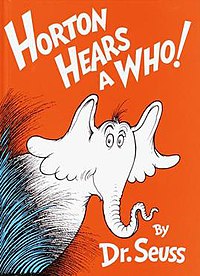
After the disaster that was the film adaptations of both How the Grinch Stole Christmas and Cat in the Hat, I decided to skip the recently made Horton Hears a Who animated film when it came to theaters. I just wasn't sure if I could see another example of my cherished childhood stories being translated into something "hip" and modern.
Thankfully, my local Blockbuster forced me to rethink my decision. Playing across one of the screens, used to sell Blu-Ray technology, I caught the very beginning of the film. And instantly, I was reminded of just how powerful of a story the Horton fable is, as is most of Seuss' work. What I hadn't realized as a child and didn't fully recognize until watching the animated variant as an adult is that at the core of the story is a call for brave prophecy and counter-culture action.
Much criticism and analysis has been offered to the Horton story as a post-WW2 allegory for the relationship between the United States and occupied Japan, presenting the United States as the protectors of a once proud, now humbled people. But more has to be read into this from an author of Seuss' background.
Seuss did a series of fairly incendiary political cartoons that depicted Japanese soldiers in the stereotypical racist style of the time. These cartoons have become something of an infamous portion of Seuss' career, showing the darker (and more human) of an otherwise beloved figure. It is not hard to see how Seuss' could have taken the situation seriously and personally; as a German-American who found the harsh actions of Hitler's fascism as an affront to humanity, he needed someone to post his anger and hatred on. Unable to demonize the Germans, like many other Germanic Americans, Seuss turned to the Japanese. Seuss once explained his relentless attack on the Japanese this way:
But right now, when the Japs are planting their hatchets in our skulls, it seems like a hell of a time for us to smile and warble: "Brothers!" It is a rather flabby battle cry. If we want to win, we’ve got to kill Japs?, whether it depresses John Haynes Holmes or not. We can get palsy-walsy afterward with those that are left.
So how is it that this man, who saw no difference between the Imperialist Japanese and Japanese-American immigrants, can get to the point to actually dedicate one of his books, one of his most beloved books, to a Japanese friend? Especially a story with the conviction that "A person's a person, no matter how small." That is a fairly unitarian message from someone who before adopted a rather "us versus them approach."
And even within the story, Seuss acknowledges that as simple as an idiom as this might seem, it has a dangerous ring to it. Horton's love and care of the Who's is not met with great acclaim. Rather, it is seen as an affront to the status quo, to the very stable nature of the jungle. The other members of the jungle are so shocked by the fact he can hear people on the tiniest speck (thanks to his relatively large ears, Horton can hear what others can't; this does the job standing in for the Bible's preferred symbol of vision), that they actually tie him up in ropes and throw him in a cage.
Being a prophet is dangerous. It is not just dangerous for the prophet, but for the society receiving the prophecy too. But as we see in the parallel story of the Who's reluctant to listen to their wise men (in the book and original Chuck Jones cartoon, Professor Whovee; in the more recent CGI cartoon, the Mayor of Whoville), that their reluctance to listen can make things far more dangerous. It is only by finally listening and raising their voices, every last one of them, are they saved at the last moment. Indeed, the danger (and sad commonness) of people not listening to their prophets is shown on both sides of the story. In one example, Whoville is almost destroyed by their sloth and inaction; in the other, Whoville is almost boiled to oblivion by fear and ignorance.
That latter example is probably the one that hit closest to home for Seuss.
